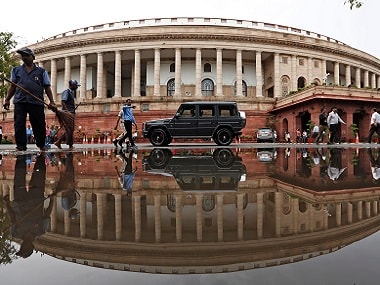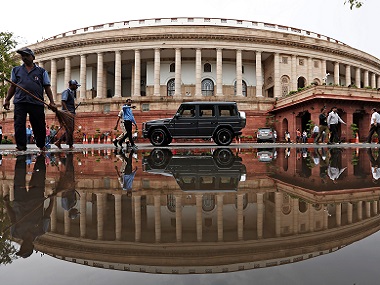Ever since the enactment of the Citizenship Amendment Act (CAA) by both Houses of the Indian Parliament, several misunderstandings have floated around not only throughout India, but globally as well. While this law is named because of the fact that it amends the Citizenship Act, 1955, — a law governing immigration and nationality in India — the real import of the amendment is to accord a special refugee status to specific groups from specific nations with citizenship as the final destination in a refugee’s journey. [caption id=“attachment_7021831” align=“alignleft” width=“380”]  File image of Parliament. Reuters[/caption] Ordinarily, refugees seeking entry or immigration status in a country are required to individually demonstrate a well-founded fear of persecution in their home country. In the US, this requirement is found in Section 207 of the Immigration and Nationality Act, the principal law governing immigration. Notably, however, back in 1989, Senator Frank Lautenberg recognised that some refugees belonging to specific religions from specific countries could be identified as ‘historically persecuted groups’ and, hence, given refugee status without requiring them to show that they individually had been persecuted. He, therefore, spearheaded a law: Public Law 101-167, also popularly referred to as ‘Lautenberg Amendment’ – which specifically benefitted the following among others:
- Nationals and residents of [former] Soviet Union who are Jews or Evangelical Christians
- Present or former nationals of [former] Soviet Union participating in religious activities of the Ukrainian Catholic Church or the Ukrainian Orthodox Church
- Nationals and residents of Islamic Republic of Iran who are members of a religious minority [this specific group was added in 2004 through an amendment to the law]
This law, therefore, specifically enlists religious communities in former Soviet Union and religious minorities in the Islamic Republic of Iran in order to confer a benefit on them to the exclusion of all other refugees, the benefit being that they don’t need to individually demonstrate a well-founded fear of persecution. Sub-section (d), in fact, permits applicants belonging to these categories to reapply if their refugee applications were denied due to the fact that they could not individually demonstrate a well-founded fear of persecution. What the Western critics of India’s CAA fail to understand are two vital points: Firstly, India has a refugee policy similar to Section 207 of the Immigration and Nationality Act pursuant to which refugees fleeing any country individually demonstrating a well-founded fear of persecution on any ground (race, religion, sex, nationality, ethnic identity, membership of a particular social group or political opinion) are provided long-term visas. This benefit is accorded through the Standard Operating Protocol (SOP) dated 29 December, 2011, which permits such refugees to take up employment in private sector and undertake studies in academic institutions. After proving eleven years of residency in India, they become eligible to apply for Indian citizenship pursuant to the Indian Citizenship Act, 1955. Indeed, migrants who arrive solely in search of better economic opportunities are purely ‘economic migrants’ and no refugee protection is, and can logically be, afforded to them. Bangladeshi Muslims predominantly fall into that category. It is also critical to note here that, for some categories of refugees such as Rohingya from Myanmar, national security considerations as well as bilateral relations override granting refugee status. Secondly, the only effect of the CAA is to enlist specific categories of people (six religious minorities) from specific countries (three neighbouring nations of Pakistan, Afghanistan and Bangladesh) as ‘historically persecuted groups’ similar to the Lautenberg Amendment obviating the need for them to meet the individual demonstration requirement. In addition, the CAA fast-tracks the amount of time these specific categories need to physically be in India in order to be eligible to apply for Indian citizenship. Back in 2013, when Senator Lautenberg passed away, the US Commission on International Religious Freedom (USCIRF) deeply mourned his loss, stating that, for more than two decades, he “championed a measure” which provides “a vital lifeline to freedom for persecuted religious minorities.” USCIRF went on to urge the US Congress to make this law permanent. As of now, the Lautenberg Amendment is required to be renewed annually. In February 2018, when the Trump administration denied asylum to around 100 religious minorities from Iran (mostly comprising of Christians), the USCIRF urged the US government to reopen their cases and grant them asylum status, stating that “few policies embody this commitment [of protecting religious freedom] more than the Lautenberg Amendment”. When the CAA was passed by the Lok Sabha (the Lower House of Parliament), a law which seeks to give historically persecuted minorities special benefits without rendering anyone else worse off in any manner, USCIRF published an ill-informed press release raising “serious concerns” and mulling “sanctions recommendations” on India for enactment of the law which, according to it, was a “dangerous turn in the wrong direction”. The tone and tenor of USCIRF’s press release was effectively carried through in mainstream newspapers and news media. The USCIRF went on to state that CAA enshrined a pathway to citizenship for immigrants which “specifically excluded Muslims, setting a legal criterion for citizenship based on religion”. That the Lautenberg Amendment specifically excluded Muslims of Iran and Soviet Union — indeed, it identified beneficiaries persecuted due to religion just like the CAA does — didn’t dawn upon the bipartisan federal commission USCIRF. That the Lautenberg Amendment specifically mentioned religions in regard to nationals and residents of former Soviet Union wasn’t an obstacle in urging the US Congress to make this law a permanent measure.


)

)
)
)
)
)
)
)
)



